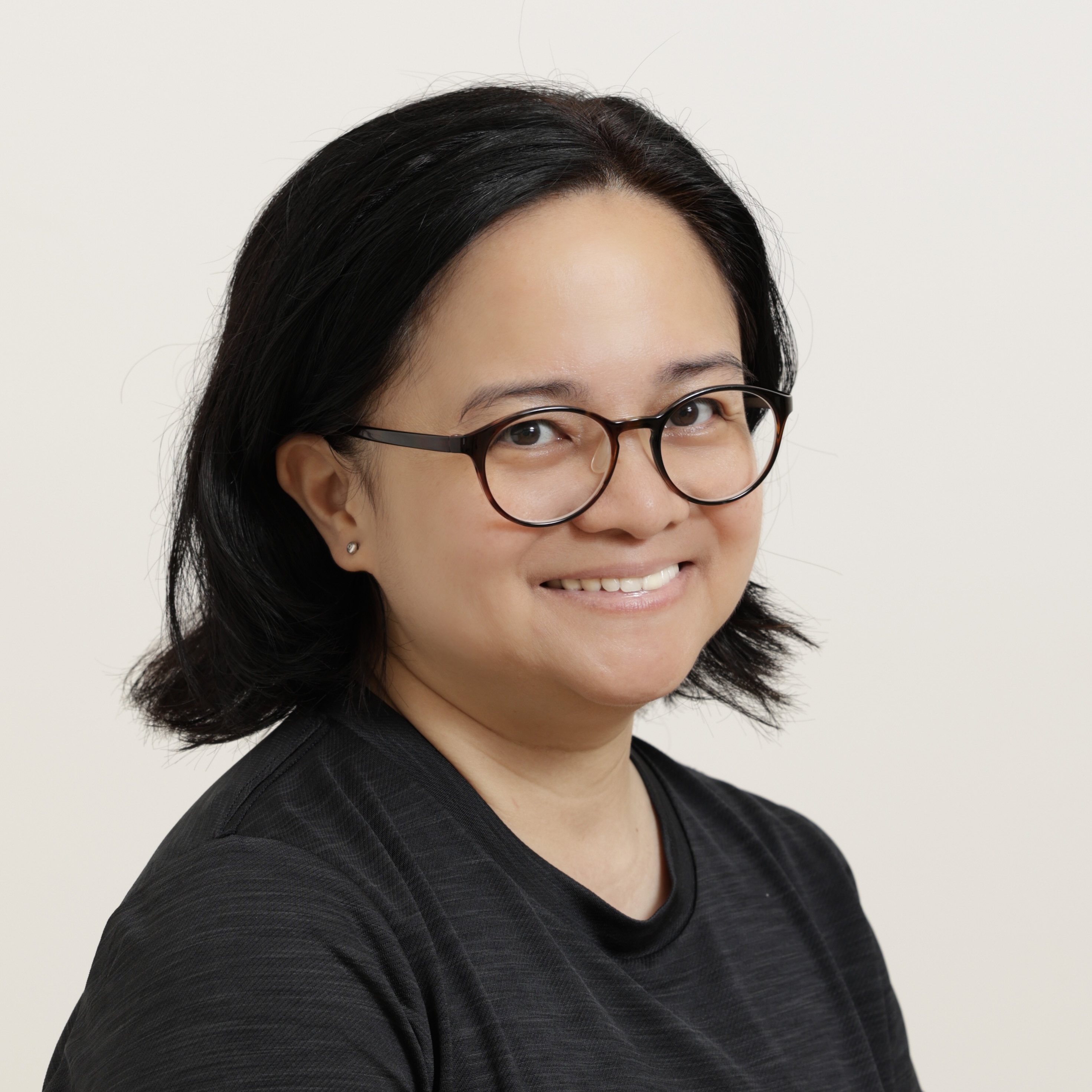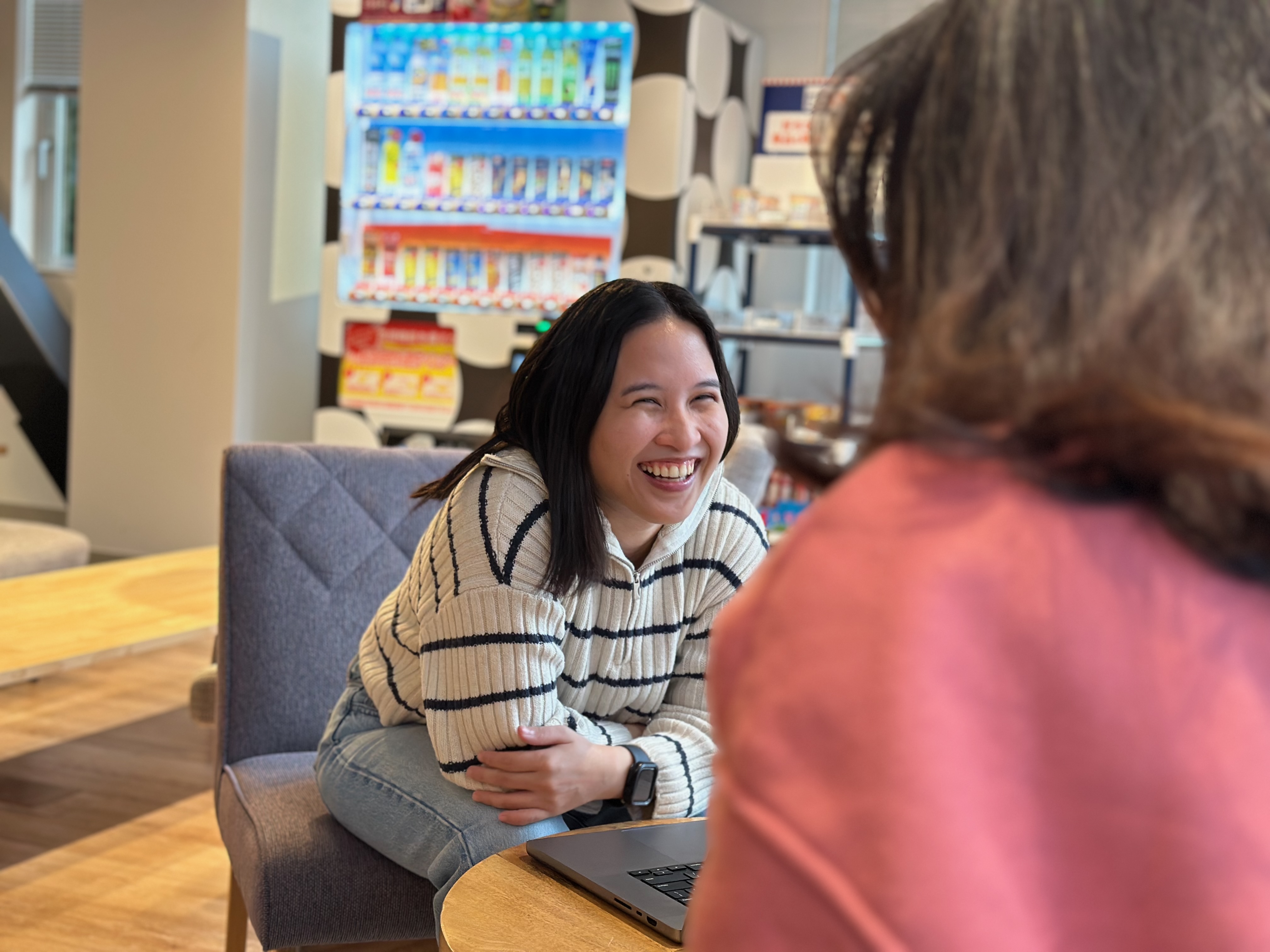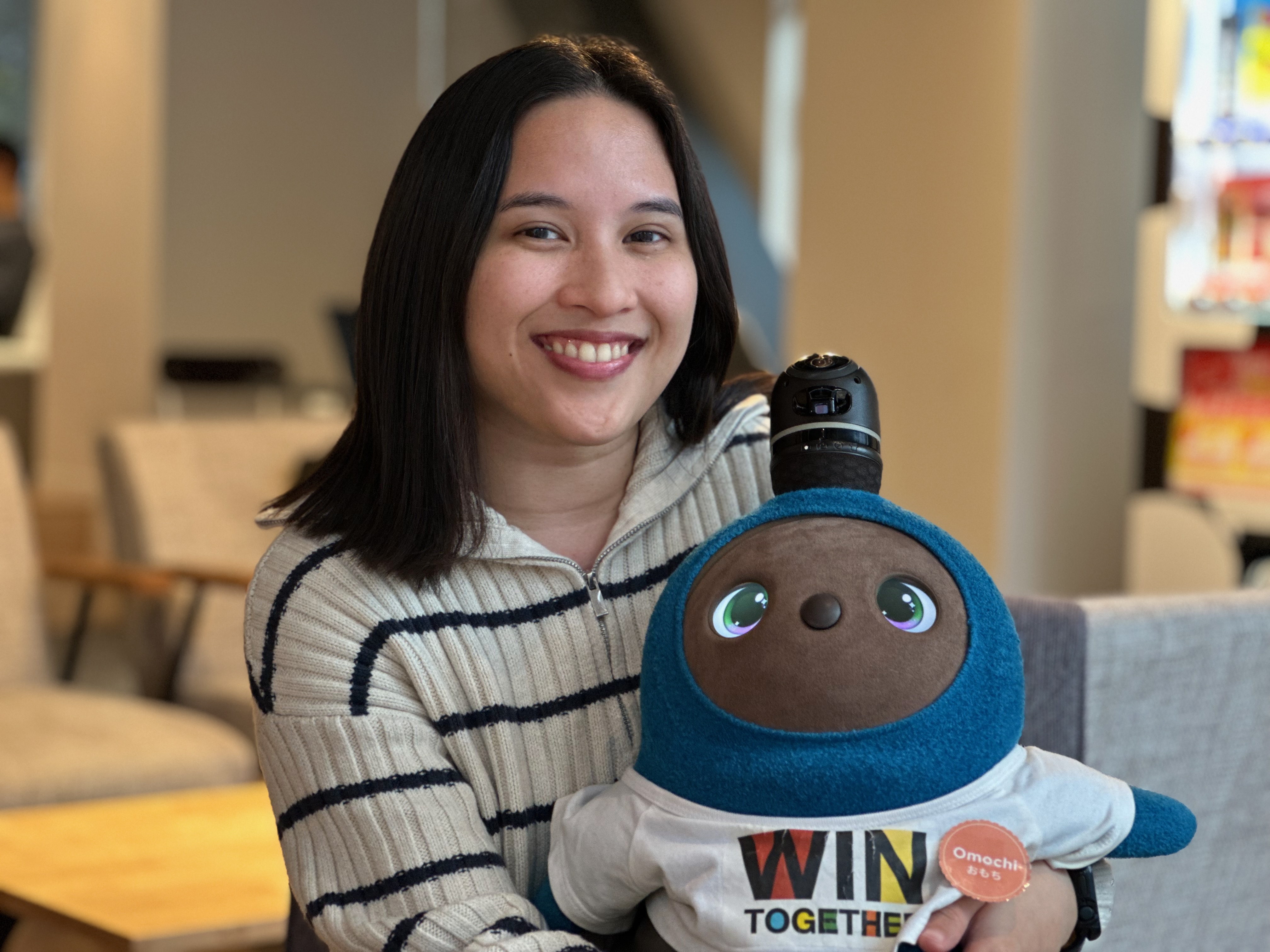
HENNGE welcomes top talent from across the globe—regardless of gender, age, or nationality. In today’s feature story, we’re excited to introduce Krizza Bullecer, one of our Front-end Software Engineers in the Cloud Product Development Division, Global Product Development. Hailing from Zamboanga del Sur in the southwestern part of the Philippines, Krizza was part of the second batch of the Global Internship Program (GIP) in 2022 before officially joining HENNGE in 2023.
Read on to discover how a simple girl living an idyllic provincial life—who once imagined working with farm animals—traveled more than 2,000 miles and landed her dream job in Shibuya, a bustling commercial district in Tokyo. You’ll also learn about Krizza’s volunteer work with Women in Software Engineering (WiSE), a non-profit organization dedicated to empowering women from all backgrounds in their tech careers.
Day in the Life of a Front-End Engineer

Krizza Bullecer (Krizza): My typical workday has changed since I joined HENNGE under the Global Internship Program, where I performed intern-related tasks. Initially, my day-to-day work mainly involved understanding the business logic behind the product, like how or why we built it.
On top of my programming work, half of my time is spent on other initiatives, such as the new GIP internship flow. My colleagues and I proposed creating a front-end-specific program, which involves organizing meetings, creating challenges for the program, and developing assignments for the interns when they come in.

Cel: What are the most rewarding aspects of your job, and what are the challenges?

Krizza: Our team is very vocal about celebrating achievements. It’s not just about rewards; everyone really makes sure our efforts don’t go unnoticed. No one takes credit for what we do, and it’s nice to be recognized for our individual contributions.
One of the challenges is gaining a deeper understanding of the diverse products we offer. Although HENNGE has a dynamic, startup-like culture, having a wide range of product portfolios can make it difficult to fully grasp the grand scheme of things and how everything fits together. Having greater transparency would be beneficial, which means I need to be more proactive in reaching out, taking more initiatives, and actively pursuing collaboration opportunities.
Work-wise, though, I don’t encounter many challenges. I tend to be a positive, “sunny” person, so even when obstacles arise, I stay focused and don’t let them get to me.

Being a Full-Time Software Engineer in Japan

Cel: Why did you want to come to Japan, and why HENNGE?

Krizza: Actually, I’ve been a fan of anime, especially when I was a child, and I also thought HENNGE’s culture was just really cool.
What really sold it for me was HENNGE’s corporate culture. Initially, I felt things were too good to be true. The website said, “We’re going to fly you over, give you an allowance, and provide you with a phone.” But I got convinced otherwise when I looked deeper. I found testimonials, like blogs, which was a smart move because it really helped prove the company’s credibility. I also saw pictures of other GIP interns, and that made things feel more real.
When I first encountered HENNGE, I was just a university student with little understanding of what being a programmer in the real world was really like. I discovered HENNGE three years before I actually applied to the program. I reviewed the experience requirements and the job responsibilities, and over those three years, I thought, “I’m going to learn everything I need to be fully prepared.” I made sure to equip myself with the necessary skills and knowledge before I even applied.

Cel: What made you decide to join HENNGE’s Global Internship Program?

Krizza: When I searched for global internship programs abroad, HENNGE was actually the first one to appear in the search results. I thought, “Wow, they have really good search engine optimization!” Whoever was responsible for that must have put a lot of effort into fine-tuning the website settings to show up for that keyword.
When I joined HENNGE’s GIP, it was during COVID, so I couldn’t make the trip. While working remotely, everyone could hear my chickens in the background. When I finally arrived in Japan, the first thing they told me was, “Chickens!” When they saw me, they were like, “You were the chicken person.” Yup, that was me! My dad has a small chicken farm.
What really hooked me, though, was the culture. When I came on board, the company was releasing HENNGE Talks, a video series to introduce the company. I was one of the live participants.
Looking Back to the Past

Cel: Were you always interested in technology as a child? What inspired you to pursue a career in tech?

I actually wanted to be a veterinarian because I liked animals—hence the chicken farm! I wanted to work with farm animals like horses, cows, pigs, and other kinds of livestock. But my parents quickly shot that idea. They said, “Those are huge animals, and you’re a tiny human being, so don’t do that.”
As for technology, I dabbled in image editing, but not necessarily the kind of work I’m doing now. My interest in tech really blossomed during college when I saw what people were doing in the field.
In my third year at university, I started joining startups, where I saw the incredible things one could do with just a computer. The first startup I joined was in the power sector. They developed a dashboard that connected business owners—like those running hotels and restaurants—with smaller electric companies. The platform used a demand-based model, similar to how households only pay for their electricity consumption. It was set up through a website with a bidding-like system. I remember thinking, “Wow, this is amazing! I wonder what else you could do with tech.”
When I looked into HENNGE, I saw they were doing something similar—just inputting simple text on a screen, yet creating impactful solutions. I’m constantly amazed by how technology can make that happen.
I’m just writing code, typing English words on a computer, and the machine translates them into ones and zeros. Somehow, it all comes together, and everyone’s happy.

Cel: What was technology like when you were a little girl?

Krizza: What I really appreciated about technology back then was the ability to connect with people around the world. My dad had to move to Saudi Arabia to work as an engineer, and we were able to maintain our connection thanks to technology. Video calls had just become mainstream, though they were still grainy, and sometimes the calls would freeze.
Now, we have cloud technology and artificial intelligence that can do what we want them to do and even act as our assistants. Tech has evolved a lot. Honestly, I’m a bit scared by the speed at which it’s going, but I’m also very interested and intrigued.
Volunteering Activities

Cel: We understand that you’re also volunteering for Women in Software Engineering (WiSE), which focuses on empowering women in the software industry throughout Japan. Could you tell us about WiSE’s current projects and activities?

Krizza: We organize bi-monthly activities in collaboration with companies like Meta and Amazon, which support the goal of increasing women’s participation in tech. We’re also looking forward to partnering with HENNGE again for our upcoming events.
We usually hold tech talk nights where women share their expertise on various technical topics. The goal is to empower women by demonstrating technical excellence and building community. We also organize non-technical lightning talk nights, where participants share their personal journeys as women in tech. These events focus on building soft skills and encouraging women to explore careers in the field, showing them that it’s not something to be scared of. Our events are open to anyone who supports our vision and mission; they’re not exclusive to women.

Cel: How does HENNGE support WiSE?

Krizza: HENNGE provided the venue and refreshments for one of our events last year, when we were still known as “Women Who Code.” We were grateful for their generosity, especially since event venues can be expensive.
In return, we provided HENNGE with a platform to showcase the company and highlight the positions they’re hiring for. The majority of our attendees are women in tech, and a lot of them are also exploring job opportunities in the field. I’ve heard very positive feedback from some attendees. They said, “HENNGE is a really cool company to work for.” Since rebranding as “WiSE,” we’ve been experimenting with Connpass to promote our events and hope to gain greater traction from the Japanese audience. Our goal is to connect with a broader base in Japan more effectively.

Cel: HENNGE has been around for quite some time, but it still considers itself a startup. What do you think is the benefit of having such a business outlook?

Krizza: I believe that having a startup mentality is a valuable asset because it makes you fearless. When you’re part of an established company, you might think, “Okay, I have a large customer base now,” and while caution is involved, large firms may sometimes hesitate to innovate due to their size and stability. Any mistake could potentially have significant consequences.
At HENNGE, one of our core values is “making mistakes early.” We have an internal event called “Fail, Fail, Fail Lightning Talk,” initiated by the People Success Section. It’s meant to encourage learning and trying new things by offering a platform for HENNGE members to share their personal stories of failure and the lessons they’ve gained from them. They really encourage us to keep innovating and trying new things, even if we make mistakes. I think that’s what really sets startups apart and something that HENNGE fully embraces.
In my startup experience, if a product wasn’t selling or the customers weren’t happy, it was time to pivot. We’d say, “Okay, let’s scrap this and move on.” I think HENNGE has adopted this kind of mindset as well.
Women in Tech

Cel: According to a recent study, women are still heavily underrepresented in technical roles. What do you think are the reasons behind this?

Krizza: I had a conversation with my peers in WiSE, and I really think it starts at a young age—especially with the things we’re exposed to as children. For example, the toys usually given to boys are fire trucks and all these cool, masculine items like dinosaurs. Girls, on the other hand, tend to get Barbie dolls and similar gender-stereotyped items. This early exposure can shape how we view career opportunities later in life.
When I told my dad I was going into IT, it was partly because I was no longer pursuing veterinary medicine, which my parents had discouraged. They suggested IT instead, and the program I chose specialized in digital arts, focusing on Photoshop and video editing.
Looking back, I wonder why my parents didn’t consider web development an option for me. In the digital arts class, most students were girls. When I started joining startups and shifted to web and mobile app development, it was mostly boys.
As women, we often face certain expectations about the career paths available, mainly because we’re presented with limited options from a young age. I believe this is why women are underrepresented—many start later because they don’t realize these careers are open to them, while boys are exposed to a broader range of options much earlier.
It really all starts at the root—at the very beginning. I agree that schools should offer equal opportunities without gender bias.

Cel: So, in the tech space, there’s also a subset of what women are expected to do, even though it’s a big field.

Krizza: Among my female friends in the tech space, I’ve noticed that once they start their careers in coding, they tend to shift toward project management, product management, or UI/UX design. It seems harder for female software engineers to stay in coding roles.
In addition, it’s often difficult for women to assert themselves and make decisions, especially in the highly logical field of software engineering, where opinions tend to be very strong and diverse. During discussions, when someone says, “We should write it this way,” or “We should code it this way,” or “This technology is better,” women may hesitate to speak up. They might agree but tend to hold back their opinions.
I think this stems from the stereotype that women should be quiet and demure. In the past, speaking up was seen as “too aggressive,” while staying silent was simply labeled as “being quiet.” Finding a balance can be challenging.
But I feel like we’re taking steps toward changing that perception—women can have strong opinions on important matters that can influence company decisions, and that’s something we’re working on. So, yeah, I think things are improving.

Cel: Do you think male and female engineers at HENNGE are given equal opportunities?

Krizza: I think so. Sau Yee, one of my teammates, has been my role model. She’s taken the lead on some projects and has collaborated proactively with customer support and product management. I aspire to be like her.
Our colleagues have been very supportive and don’t hold her back from seizing opportunities to grow and learn. They encourage her by saying, “You can do it!” I love our team dynamics.
In my previous startups, I was the only female engineer, so I had to learn to stay true to myself. If something didn’t sit well with me, I’d speak up. So far, I haven’t received any negative feedback from my co-workers.
The newer generation seems much more open to diversity and inclusivity. When I came on board, my dad was very concerned that I was joining as an engineer. He asked, “Are you sure you want to do this?” I said, “Dad, there are girl engineers here!” I told him it’s not about gender; it’s about skill.

Personal Experience

Cel: Based on your personal experience, what is it like being a woman in tech, and how do you overcome hurdles?

Krizza: I’ve always looked up to strong female figures, and I grew up in a matriarchal household where my mom wears the pants. So, I feel like emulating my role models and my upbringing really helps. She always believed in me, even if my dad sometimes had doubts about my abilities based on my gender. Even if my dad disagreed, my mom was the one who pushed me. She’d say, “She’s a girl, but that doesn’t really matter.”
At university, I also joined Women Who Code in Manila, Philippines. It introduced me to successful women in tech and made me realize it’s not something out of reach. Most of the directors—two of whom were founders of their own companies—became my role models. I think having exposure to the kind of woman you want to become is important, and that has been very helpful for me.

Cel: Do you think there are enough opportunities for women in tech?

Krizza: I believe opportunities are open to everyone, regardless of gender. While women may have had a slower start, I don’t think it’s going to stay that way for long.
During my time with Women Who Code in Manila, I felt like we were making great progress. In many patriarchal societies, women often face barriers to higher roles and may not always have the chance to pursue careers in fields like engineering. While many women-led groups are taking steps to encourage more women to join the tech space, I feel like the opportunity should be presented to them at a younger age.

Cel: How do you keep up with the latest tech trends?

Krizza: I listen to many podcasts, like Syntax, and watch Fireship on YouTube. They’re both great because they discuss the latest tech trends.
I’m also really grateful for my co-workers. There’s a lot I have to do in my day-to-day work, so I don’t always have time to stay on top of everything. They’re the ones who let me know, “Did you know about this?” So, there’s still a lot of information-sharing among us every day. But if you’re not in a field surrounded by people who can easily share new tech trends, YouTube and podcasts are really helpful.
Conclusion

Cel: What’s your advice for young women who want to pursue a career in the tech space?

Krizza: Women who want to pursue a career in the tech industry should start exploring it early. It’s amazing now because you don’t even have to go to college—you have YouTube University, and everything is free.
One challenge is the countless options, which can lead to analysis paralysis. The younger generation faces so many possibilities, but it can become overwhelming when there are too many choices.
If they want to pursue a tech career, I’d say it’s very easy to get started. Just dive in. Technology is constantly changing, and the tech from one year ago may not be as relevant now. We had the Web3 and non-fungible token craze, and now we have AI—everything is evolving at lightning speed. Fields like machine learning and AI are always shifting, and engineers will face different challenges in the next five years, especially with AI becoming more prevalent. Many people fear they’ll lose their jobs to AI, but I disagree because AI is still in its incipient stage, which needs human mediation.
In the future, companies—perhaps even HENNGE—may prioritize strong critical problem-solving skills. As programmers, we solve bugs, fix workflow inefficiencies, and translate those solutions into the web apps or services we offer. So, my advice is to just start doing it and honing their critical thinking and analysis skills.

Cel: That’s a wrap! Thanks Krizza for sharing your career story and for shedding light on WiSE’s efforts to empower women in tech.

About Women in Software Engineering (WiSE) Japan
Women in Software Engineering (WiSE) Japan is a vibrant community of diverse women and allies in tech careers. As the successor of Women Who Code Tokyo, WiSE supports women across Japan in advancing their tech careers. The group encourages members to pursue leadership roles, speak at tech events, and build a strong network of female software engineers.
WiSE provides a safe space and networking opportunities for women to connect, exchange ideas, and challenge stereotypes that may hinder their growth. WiSE fosters a community that recognizes and values women of technical excellence for their capabilities without needing justification. Through regular technical talks, members share their expertise and create a positive impact on the tech community. In partnership with global tech giants and emerging startups committed to diversity and inclusion, WiSE offers a platform that celebrates women’s voices in tech and creates opportunities for learning and professional development.HENNGE also supports various events and communities, such as PyLadies and Enterprise IT Women’s Forum, that empower women to realize their full potential.
At HENNGE, success knows no gender boundaries—everyone can freely express their authentic selves and thrive without limitations. Explore our job openings here and see how you can break barriers and redefine the norm.
Cel Ogiya (Cel): Hi Krizza! Can you walk us through your typical workday at HENNGE?